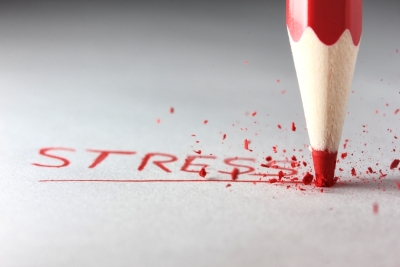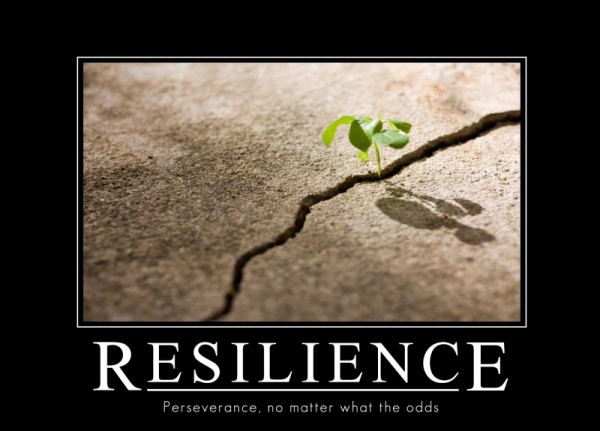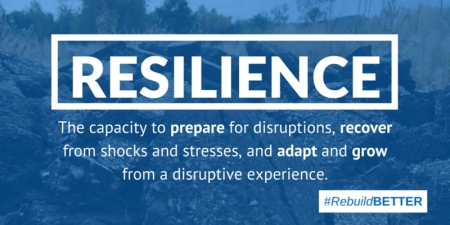As rates of depression and anxiety rise, it isn’t too surprising that social attitudes towards mental illness have improved considerably. However, as the current economic climate continues to strain our mental health, it also demands us to stay positive in the face of stress and uncertainty. Have we become so accepting of the stressful demands of modern life that we blame ourselves if we struggle to cope?
Having a mental health problem is less abnormal and more socially acceptable than ever, which isn’t surprising given that rates continue to rise, particularly in younger generations. Many of us are now aware of the finding that about one in four people report having a diagnosed mental disorder (1). Governments and institutions are starting to take notice and, reflecting a wider trend, one theme of this year’s Mental Health Awareness week is how we can build resilience to help people cope with the demands of life.
The concept of resilience can be a slippery slope. If we take it too far we risk forgetting that excessive demands and stressors are why so many of us are struggling – not our lack of resilience. For example, we know that the current rise in mental illness is in part driven by economic adversity, stemming from the avoidable global recession in 2009. Plenty of research demonstrates the serious consequences of economic recession for mental health (2, 3), and eight years on, the job market is as competitive as ever, the cost of living rises and the threat of unemployment still looms for many.

A headline from the The Independent. While governments and institutions are starting to take notice of mental health issues, there is still a long way to go.
Workplace stress is a persisting issue, as employers expect their employees to take on more hours and responsibilities, to work well under pressure, and always go the extra mile. This is a particular problem for academics, who face growing levels of mental health problems in what has been described as a long-hours culture, where poor work-life balance can become the norm (4). Like other employees, academics feel the pressure to distinguish themselves, and a list of high-quality publications has become the currency of employability. Dr Alan Swann of Imperial College London describes how stress and a high workload contributes to mental health problems in academics: “They are thinking about their work and the consequences of not being as good as they should be; they’re having difficulty switching off and feeling guilty if they’re not working seven days a week.” (4).
 In such difficult times, it is of course important to be hardworking and resilient. But by thinking of resilience as a matter of perseverance or ‘grit’, do we risk seeing a lack of resilience as a personal failure or weakness? We often forget that while the pressures we face may have become normal, they certainly weren’t always so extreme. If we allow ourselves to start seeing the demands of the strained economy as normal, unavoidable and reasonable, we risk seeing our struggle to meet them as unreasonable. It then becomes all too easy to see ourselves as easily overwhelmed when we experience excessive stress, fatigue, anxiety or depression.
In such difficult times, it is of course important to be hardworking and resilient. But by thinking of resilience as a matter of perseverance or ‘grit’, do we risk seeing a lack of resilience as a personal failure or weakness? We often forget that while the pressures we face may have become normal, they certainly weren’t always so extreme. If we allow ourselves to start seeing the demands of the strained economy as normal, unavoidable and reasonable, we risk seeing our struggle to meet them as unreasonable. It then becomes all too easy to see ourselves as easily overwhelmed when we experience excessive stress, fatigue, anxiety or depression.
“We need to recognise when we’re judging ourselves by an unattainable standard”
How we perceive our struggles can have a substantial effect on our mental health and our ability to pursue our goals effectively. Qualitative research on self-stigmatisation has shown that many patients with depression or anxiety experience subjective feelings of guilt, embarrassment and isolation due to their condition, even in the absence of discrimination (5). Separate research has shown that self-stigmatising beliefs threaten our long-term goals and wellbeing, by reducing our self-esteem and self-efficacy while increasing hopelessness (6).
All of this suggests that to overcome our struggles and effectively pursue our goals, we need to be more compassionate towards ourselves. We need to remember that the demands we face are by no means easy to manage, and we need to recognise when we’re judging ourselves by an unattainable standard. It is easy to feel inadequate and burdensome when we see ourselves struggling while others seem to be doing fine. This also makes it easier to ignore our mental health in the belief that enough perseverance will get us through. However, stress-related fatigue and mental health problems don’t go away unless something changes. If we see the signs, there is a real problem somewhere that needs addressing – whether it’s work-life balance, isolation, problems with self-esteem, or just an excess of responsibilities and stressors.
“Resilience may be something to aspire to, but we have to be careful not to take it too far.”
Resilience may be something to aspire to, but we have to be careful not to take it too far. More crucially, we need to stop thinking of resilience as an inherent toughness or ‘grit’ that some have and some don’t. Rather, resilience at least partly depends on how we cope with stress, how we view ourselves, and whether we attribute successes and failures to ourselves or to environmental factors. Finally, we need to remember that our mental health is largely a product of our environment, especially when environments are more extreme. Therefore, we do ourselves a great disservice by dismissing signs of a problem as just our own failure to cope.
References:
- Health Survey for England (2014). Retrieved 1st May 2017 from http://healthsurvey.hscic.gov.uk/support-guidance/public-health/health-survey-for-england-2014/key-findings.aspx
- Frasquilho, D., Matos, M. G., Salonna, F., Guerreiro, D., Storti, C. C., Gaspar, T. & Caldas-de-Almeida, J. M. (2016). Mental health outcomes in times of economic recession: a systematic literature review. BMC public health, 16(1), 115.
- Evans-Lacko, S., Knapp, M., McCrone, P., Thornicroft, G. & Mojtabai, R. (2013). The mental health consequences of the recession: economic hardship and employment of people with mental health problems in 27 European countries. PLoS One, 8(7), e69792.
- Shaw, C. & Ward, L. (2014) Dark thoughts: why mental illness is on the rise in academia. The Guardian Higher Education Network. Retrieved 3rd May 2017 from https://www.theguardian.com/higher-education-network/2014/mar/06/mental-health-academics-growing-problem-pressure-university
- Dinos, S., Stevens, S., Serfaty, M., Weich, S. & King, M. (2004). Stigma: the feelings and experiences of 46 people with mental illness. The British Journal of Psychiatry, 184(2), 176-181.
- Corrigan, P. W., Larson, J. E. & Ruesch, N. (2009). Self‐stigma and the “why try” effect: impact on life goals and evidence‐based practices. World Psychiatry, 8(2), 75-81.




[…] can’t pour from an empty cup, so take the time to refill. As Daniel suggested in his post last week, it’s important to be compassionate to yourself. Pay attention to your emotional […]